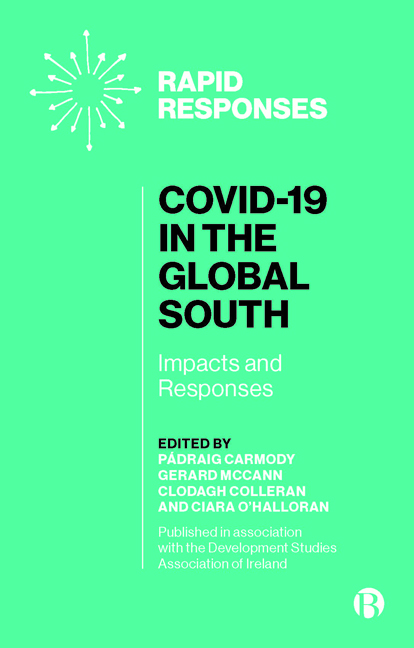8 - Africa and the Economic Pathologies of the COVID-19 Pandemic
Published online by Cambridge University Press: 23 March 2021
Summary
In December 2019, news of yet another deadly respiratory disease arose – this time from Wuhan, China. Unlike recent zoonotic diseases like Ebola that suddenly and enigmatically emerged locally, African governments had time to prepare. On 27 January, after four Asian countries reported cases, the African Centre for Disease Control (CDC) initiated an emergency operations centre to coordinate the response. The first case was not detected on the continent until 19 February. Within a few weeks, many governments began to impose travel restrictions and mandatory quarantine periods for people arriving from Asia and Europe. In the following weeks, over 40 countries closed borders (Loembé et al, 2020).
On 28 April 2020, the US hit a million infected people with 2,000 deaths per day. Africa had recorded only 32,000 cases and 1,400 total deaths to that point. Influential publications like the Financial Times suggested: ‘Maybe, just maybe, the continent could be spared the worst of the pandemic’ (Pilling, 2020: 1). The article continued to point to all the positive factors including ‘early lockdown’, ‘less dense population’, ‘the effect of ultraviolet’, ‘a climate that meant people spent more time outside’ and ‘Africa's youthful population’.
The optimism has quickly faded. While Africa took 93 days to hit the first 100,000 cases, the number doubled only 16 days later on 7 June. By the end of June, the numbers had roughly doubled again to nearly 400,000 cases and close to 10,000 deaths. By the third week in July, they again doubled to almost 800,000 infections with nearly 17,000 deaths. On 6 August, it surpassed the milestone of 1 million cases with 22,000 people deceased, exceeding an estimated 15,000 deaths from all recorded Ebola cases (1976– 2000). However, the numbers in reality are significantly higher (Africa.news, 2020; Africa CDC, 2020, WHO, 2020). On 29 June, the New York Times proclaimed in their headlines that the ‘Coronavirus is Battering Africa's Growing Middle Class’ (Dahir, 2020).
This chapter will argue that that the optimism followed by the growing realization of the severity of the impact on the continent is part of a false narrative that has become popular in orthodox circles. The narrative argues that African countries that followed the neoliberal dictates of the international financial institutions have been rewarded with growth and prosperity in their open integration into the global economy, as evidenced by their growing ‘middle classes’.
- Type
- Chapter
- Information
- COVID-19 in the Global SouthImpacts and Responses, pp. 85 - 94Publisher: Bristol University PressPrint publication year: 2020



